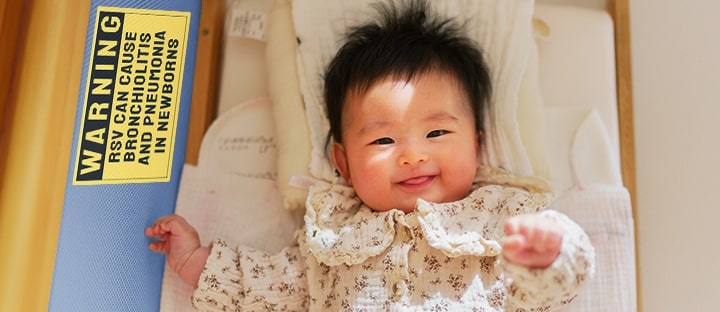

UNDERSTANDING MORE ABOUT RSV AND ITS RISK TO OLDER ADULTS
With more people talking about the risks of RSV, adults 60 and older are now learning that RSV may affect them, too. In fact, in some older adults, RSV can be very serious; in some cases, it can lead to hospitalization or death.1
Don't let RSV catch you off guard—If you’re over the age of 60, including those with underlying medical conditions, you could be at risk for severe RSV.1
WHAT IS RSV, AND HOW DOES IT SPREAD?
RSV is a highly contagious respiratory virus that can make you sick and possibly send you to the hospital, especially if you are 60 years and older.1 RSV can be spread by touching an infected surface or if an infected person coughs or sneezes and their droplets contact another person's eyes, nose, or mouth.2
AGING AND RSV
As you age, you are at greater risk of experiencing more severe RSV because your body has a harder time fighting the infection.1 It’s important to help protect yourself against potentially serious respiratory diseases like RSV.
RSV AND OTHER HEALTH CONDITIONS
If you are over 60 and living with certain conditions such as chronic obstructive pulmonary disease (COPD), asthma, heart disease, diabetes, and chronic kidney disease, you could be at an increased risk of severe RSV.1,3
RSV can also cause severe disease in people in long-term care facilities as well as those with a weakened immune system.1,3
WARNING: RSV CAN BE SERIOUS
RSV can be a dangerous virus. Older adults may experience severe RSV-related complications such as difficulty breathing or hospitalization. In more serious cases, RSV may lead to death.1,4
CHANCES OF HOSPITALIZATION IN OLDER ADULTS
Like the flu, RSV can lead to serious consequences in older adults, including hospitalization and death.5
In 1 study of adults 60 years and older in the United States who were hospitalized with either RSV (645 people) or flu (1,878 people) from 2011 to 2015, RSV caused:
Longer hospital stays vs flu: 43% with RSV vs 31% with flu stayed 7+ days in the hospital6
Nearly 2x more pneumonia: 47% with RSV vs 26% with flu6
RSV can cause respiratory disease that may make it difficult to breathe or possibly require hospitalization.4
RSV CAN HAVE A LASTING IMPACT FOR OLDER ADULTS
A study of adults 60 years and older who were hospitalized from RSV showed that RSV affected their ability to independently complete daily tasks.*7
AFTER HOSPITALIZATION, 1 IN 3 HAD MORE TROUBLE INDEPENDENTLY COMPLETING DAILY TASKS SUCH AS7:
- Getting dressed
- Going to the bathroom
- Feeding themselves
*This study took place in New York State between 2017 and 2020 and looked at adults aged 60 years and older who were hospitalized due to RSV. Six months after being discharged from the hospital, 32% of older adults scored worse on activities of daily living assessments.
ATTENTION: RSV SYMPTOMS CAN RANGE FROM MILD TO SEVERE
RSV can start with mild symptoms that appear to be an ordinary cold, like congestion, runny nose, sore throat, or fever. But RSV may escalate to more severe symptoms.4
Wet cough
A cough that produces phlegm or mucus
Wheezing
A high-pitched whistling sound made while breathing
Gasping for breath
Labored or difficulty breathing or shortness of breath
Pneumonia
An infection that causes fluid in the lungs, making it difficult to breathe
Talk to your doctor to learn more about RSV.
HOW TO HELP MANAGE RSV
If you get sick with RSV, your doctor may first tell you to:
Drink fluids and take over-the-counter medicines that help reduce fever or aches4
Call the doctor’s office or go to the hospital if your symptoms quickly become worse or you are having trouble breathing
WAYS TO HELP PROTECT AGAINST RSV
Washing your hands, avoiding close contact with sick people, and cleaning surfaces can help stop the spread of RSV.8
Seek advice from a healthcare professional if you or your child display symptoms that could indicate an RSV infection



